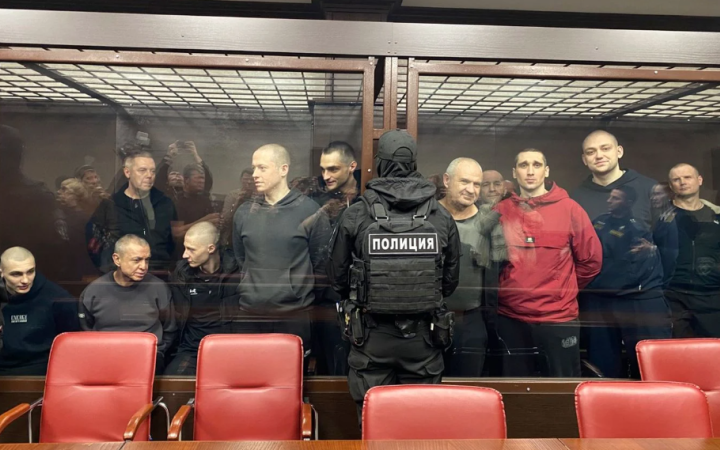The Southern District Military Court in Rostov-on-Don has sentenced Ukrainian prisoners of war who served in the Azov regiment over the years to prison terms in a maximum-security colony, Mediaportal reports.
Yaroslav Zhdamarov, Oleksandr Merochenets, Mykyta Timonin, Oleksandr Mukhin, Oleh Tyshkul, and Artur Gretskyy were sentenced to 22 years in a maximum-security colony. Oleksandr Irkh and Artem Grebeshkov received 20-year sentences. Oleh Mizhgorodskyy was sentenced to 17 years, Oleh Zharkov to 13 years, Anatoliy Gritsyk to 19 years, and Oleksiy Smykov to 23 years in a strict-regime colony.
All of them plan to appeal the verdict.
Eleven of the defendants were sentenced in absentia, as they had already returned to Ukraine as part of a prisoner exchange. In particular, Davyd Kasatkin and Dmytro Labinskyy were sentenced in absentia to 23 years in a strict-regime colony.
Nine women who had been exchanged and had worked as army cooks at different times were also sentenced in absentia to real terms in a general-regime colony, as there are no maximum-security women’s colonies in Russia.
Olena Abramova, Olena Bondarchuk, Liliya Pavrianidis, Nina Bondarenko, Iryna Mogitych, Vladyslava Mayboroda, and Maryna Tekin were sentenced in absentia to 13 years in prison, while Liliya Rudenko and Nataliya Golfiner received 14-year sentences. All of them were exchanged in September last year.
The case against Oleksandr Ishchenko, who died in the Rostov detention centre, was closed, so he was not sentenced.
The charges against the captured Ukrainians were based on their service in Azov at different times and claims that they allegedly expressed “negative attitudes towards the Russian-speaking population” and held “pro-Ukrainian radical views.”
In court, the Azov fighters repeatedly stated that their testimony had been falsified and that they had faced interrogations without lawyers, humiliating treatment, denial of medical care, and torture.
“I saw bags on their heads, wires on different limbs, broken ribs, broken kidneys, people beaten to death, hunger for more than a year, no medical care, people rotting – legs, arms – lice, bedbugs, two showers in the year we went – we left dirtier than we came,” Mykyta Timonin said in his final statement.








